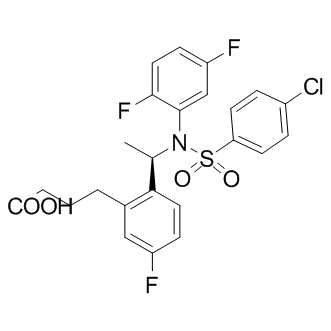
BMS-299897
CAS No. 290315-45-6
BMS-299897( BMS 299897 | BMS299897 )
Catalog No. M13893 CAS No. 290315-45-6
A potent γ-secretase inhibitor that preferentially inhibits cleavage of the APP CTF cleavage with IC50 of 7.1 nM.
Purity : >98% (HPLC)
 COA
COA
 Datasheet
Datasheet
 HNMR
HNMR
 HPLC
HPLC
 MSDS
MSDS
 Handing Instructions
Handing Instructions
| Size | Price / USD | Stock | Quantity |
| 5MG | 47 | Get Quote |


|
| 10MG | 87 | Get Quote |


|
| 25MG | 160 | Get Quote |


|
| 100MG | Get Quote | Get Quote |


|
| 200MG | Get Quote | Get Quote |


|
| 500MG | Get Quote | Get Quote |


|
| 1G | Get Quote | Get Quote |


|
Biological Information
-
Product NameBMS-299897
-
NoteResearch use only, not for human use.
-
Brief DescriptionA potent γ-secretase inhibitor that preferentially inhibits cleavage of the APP CTF cleavage with IC50 of 7.1 nM.
-
DescriptionA potent γ-secretase inhibitor that preferentially inhibits cleavage of the APP CTF cleavage with IC50 of 7.1 nM; 15-fold lower IC50 value for Notch-1 cleavage (IC50=105.9 nM) in vitro; alleviates Aβ1-42 seeding and short-term memory deficits in the Aβ25-35 mouse model of Alzheimer's disease.Alzheimer's Disease Discontinued.
-
In VitroBMS-299897 reduces the levels of each of the Aβ peptides. At 1 μM, BMS-299897 decreases these peptides to levels ranging from 20 to 50% of the vehicle control. BMS-299897 treatment reduces the portion of QD-BDNF signals moving in the retrograde direction (p=0.0198) with a concomitant increase in the portion of signals moving in the anterograde direction (p=0.0147).
-
In VivoBMS-299897 shows dose- and time-dependent reductions of amyloid β-peptide (Aβ) in brain, cerebrospinal fluid (CSF), and plasma in young transgenic mice, with a correlation between brain and CSF Aβ levels. BMS-299897 reduces both brain and plasma Aβ1-40 in APP-YAC mice and increases brain concentrations of APPcarboxy-terminal fragments, consistent with γ-secretase inhibition. BMS-299897, attenuates this Aβ25-35-induced Aβ1-42 seeding and toxicity. BMS-299897 is administered at 0.1-1 nmol/mouse, concomittantly with Aβ25-35 (9 nmol) in male Swiss mice. After one week, the contents in Aβ1-42 and Aβ1-40, and the levels in lipid peroxidation are analyzed in the mouse hippocampus. Mice are submitted to spontaneous alternation, passive avoidance and object recognition to analyze their short- and long-term memory abilities. Aβ25-35 increases Aβ1-42 content (+240%) but fails to affect Aβ1-40. BMS-299897 blocks the increase in Aβ1-42 content and decreased Aβ1-40 levels significantly. The compound does not affect Aβ25-35-induced increase in hippocampal lipid peroxidation. Behaviorally, BMS-299897 blocks the Aβ25-35-induced deficits in spontaneous alternation or novel object recognition, using a 1 h intertrial time interval. The co-administration of the γ-secretase inhibitor BMS-299897, in the 0.1-1 μmol/mouse dose-range, completely blocks the Aβ25-35-induced increase in Aβ1-42 content.
-
SynonymsBMS 299897 | BMS299897
-
PathwayWnt/Notch/Hedgehog
-
Targetγ-secretase
-
Recptorγ-secretase
-
Research AreaNeurological Disease
-
IndicationAlzheimer Disease
Chemical Information
-
CAS Number290315-45-6
-
Formula Weight511.941
-
Molecular FormulaC24H21ClF3NO4S
-
Purity>98% (HPLC)
-
SolubilityDMSO: ≥ 30 mg/mL
-
SMILESO=C(O)CCCC1=CC(F)=CC=C1[C@H](N(C2=CC(F)=CC=C2F)S(=O)(C3=CC=C(Cl)C=C3)=O)C
-
Chemical NameBenzenebutanoic acid, 2-[(1R)-1-[[(4-chlorophenyl)sulfonyl](2,5-difluorophenyl)amino]ethyl]-5-fluoro-
Shipping & Storage Information
-
Storage(-20℃)
-
ShippingWith Ice Pack
-
Stability≥ 2 years
Reference
1. Barten DM, et al. J Pharmacol Exp Ther. 2005 Feb;312(2):635-43.
2. Meunier J, et al. Eur J Pharmacol. 2013 Jan 5;698(1-3):193-9.
3. Goldstein ME, et al. J Pharmacol Exp Ther. 2007 Oct;323(1):102-8.
molnova catalog



related products
-
BMS-708163
A potent, selective and orally bioavailable inhibitor of γ-secretase with Aβ40 IC50 of 3.0 nM.
-
PF-06648671
PF-06648671 (PF6648671) is a novel oral γ-secretase modulator being developed for the treatment of Alzheimer's disease.
-
E-2012
A potent, second-generation γ-secretase modulator that decreases Aβ(1-39), Aβ(1-40) and A(1-42), and increases Aβ(1-37).



 Cart
Cart
 sales@molnova.com
sales@molnova.com


